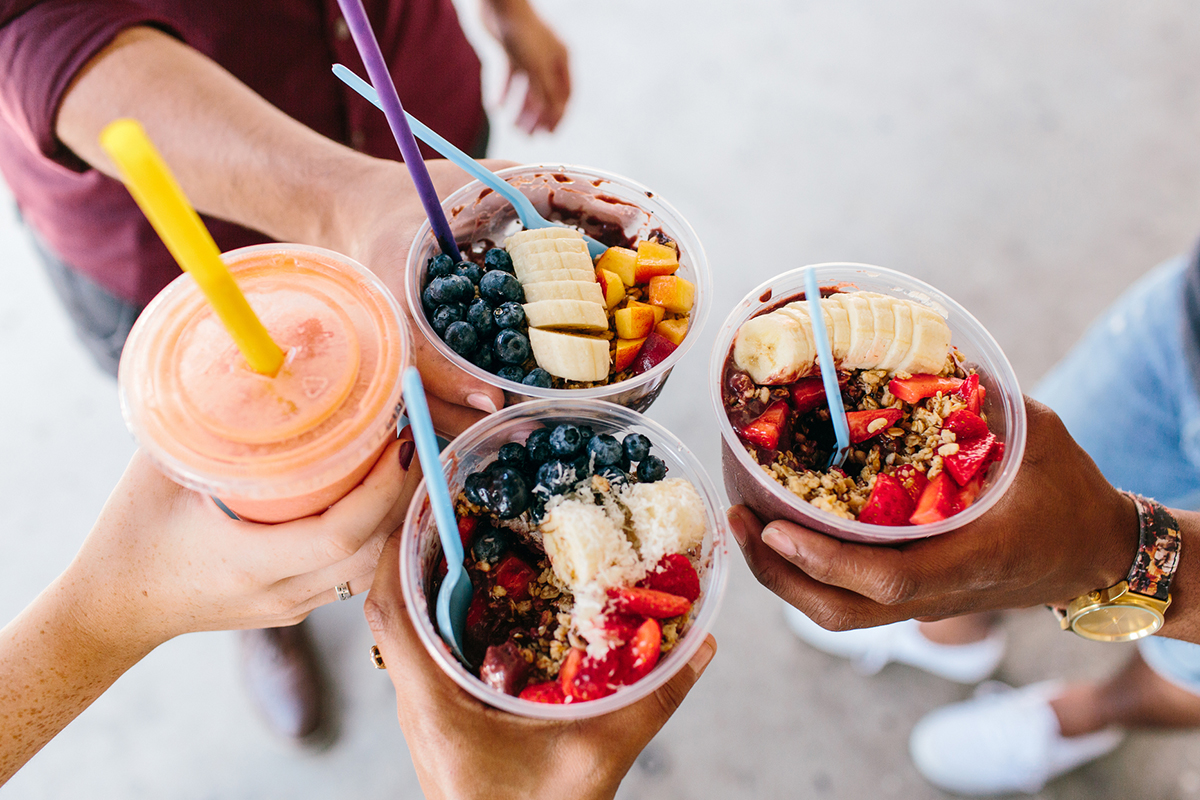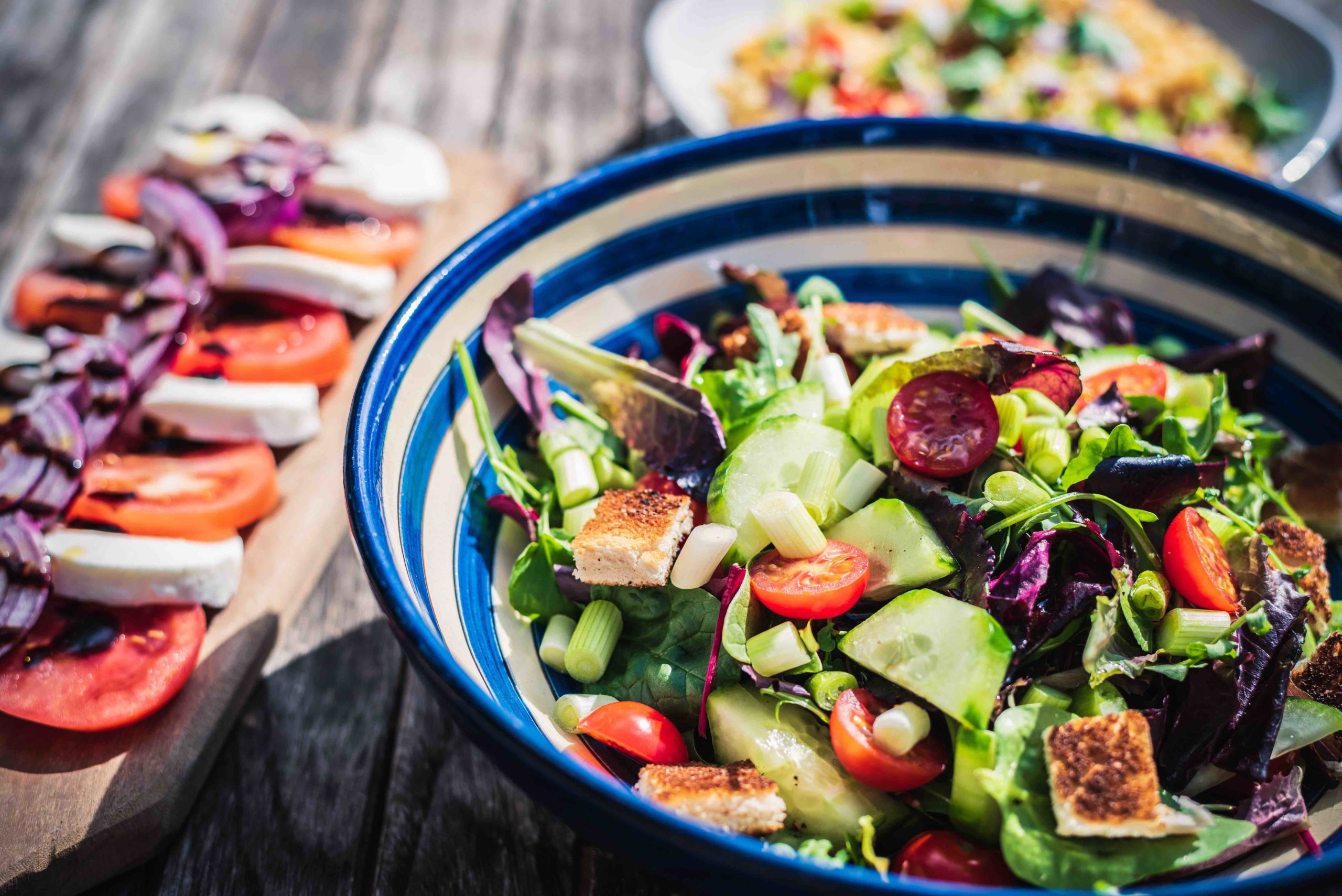You have the best of intentions: you start off the week with the motivation to eat better, workout more and get your full eight hours of sleep. But if you’re anything like me, you get sucked into a new TV show, order takeout, hit snooze and miss your morning workout.
But here’s the catch: being healthy doesn’t have to be complicated. It’s actually possible to make small life changes that will lead you to be the best version of yourself—a healthier version. We admit that sounds a bit far-fetched and overly optimistic. That’s why we caught up with three health and nutrition experts to compile seven simple tips to lead you on a fast track to freedom.
Start small
Atkins, South Beach, Weight Watchers—they’re effective for some people but not for everyone. And that’s OK. For most people, changing diets simply means reducing sugar and adding more vegetables to your meals. But that doesn’t mean that you drop all sugar consumption on day one. “Allow your habits to change over time. It’s important to think long term and say no to restrictive diets,” says Jill Weisenberger, MS, RDN, CDE, FAND, CHWC and author of The Overworked Person’s Guide to Better Nutrition. If you make a 180, it will be harder for you to maintain this new lifestyle. Instead try making changes little by little, eventually leading to a sustainable, healthy diet.
Oh, sugar!
Changing your diet is not a one-size-fits-all kind of deal. While there are general changes we can all make, each individual has their own weaknesses that need attention. But if there’s one thing most nutritionists can agree on it’s that most people need to cut back on their sugar intake, especially high fructose corn syrup and cane sugar. “Sugar is addictive and when you first stop it, your body will throw a tantrum. That’s a mind over matter issue. You have to decide to do it and hold steady for at least two weeks for an acute withdrawal,” said Dr. Rachel Carlton Abrams, board certified in family medicine and integrative medicine and the author of Bodywise: Discovering Your Body’s Intelligence for Lifelong Health and Healing. Treating yourself is important, but like anything, moderation is key. If you’re looking to make a major health change, stop giving in to your sweet tough (yeah, we know it’s tough) and with time, you’ll feel and see a major change in your body.
Listen to your body
It’s true: Your body tells you exactly what you need. Yes, sometimes boredom calls and you catch yourself unconsciously scarfing down yet another pint of Ben & Jerry’s, but generally speaking, your body is the dictator of your actions. This comes into play when you’re making any changes to your diet. “Pay attention to your energy levels, mentality, and sleep patterns after eating clean for a few days. Do you feel strong? Energized? Positive? Then focus on how your body feels when you indulge in unhealthy foods. Oftentimes, I find this is enough to make people want to continue eating healthy,” said Dempsey Marks, fitness expert and co-creator of the PreGame Fit program.
Catch more zzz’s
There’s a reason why so many people talk about the importance of clocking in eight hours of sleep each night. Seriously, why do you think Apple integrated the Bedtime feature in iOS 10? It’s simple: sleep matters. A lack of sleep doesn’t only make you grumpy, cloudy and straight-up unpleasant. Sleep also affects your appetite—for real. “Many people think that if you lose sleep, you’re tired and otherwise it’s no big deal. It’s actually far more significant than that. When you don’t sleep, you stop producing leptin, which are appetite suppressants, and you start producing ghrelin, which increases appetite,” Dr. Abrams says. Feeling well-rested should be a priority. But what does that mean? If you can wake up feeling ready to take on the day without caffeine, she says, then your body is at its optimal potential and can digest food properly.
Focus on the good
Some people think eating healthy is bland, boring and limited. But health experts and foodies have proved that there’s no truth to that statement. A healthy diet is truly a way to add more good, wholesome food into your diet. Simply find healthy options that you like and incorporate them into your day-to-day life. Changing up your diet does not mean that you have to force yourself to eat food that you hate. Not everyone is going to love beets, Brussels sprouts or lentils, and that’s A-OK. “Add more of the good stuff,” Weisenberger says. “If you’ve been enjoying beans just once a week, add a second vegetarian dinner. If you have favorite fruits, but eat them only now and then, vow to eat fruit once or twice a day. If yoga relaxes you or helps you feel centered for your day, squeeze an extra class in each week. Focus on eating and doing what’s good for you instead of focusing on all the things you think you have to give up.”
Surround yourself with love
The ultimate power duo is good friends and good food. Think about any accomplishment you’ve made in your life. Would you have been able to achieve it without the support of loved ones? There’s power in community, especially when you’re trying to overcome an obstacle or make a significant change in your life. And that applies to switching up your diet. Dr. Abrams says, “Love and community is more powerful than exercise and food when it comes to your health. We do better in community with others. When we’re isolated, we go into stress response which can result in poor health choices.” Stay active and social by joining a hiking club, inviting friends over to meal prep and sign up for a healthy cooking class with a significant other. Not only do loved ones hold you accountable, but they also you’re biggest cheerleaders as you make a major lifestyle change.
Say ‘no’ to deprivation
If pizza parties are a Friday night staple for you, it would be crazy (and crazy difficult) to get rid of them entirely. Maybe cut back from three slices to two? Or eat one slice and then complement it with a side salad? When many people think about dieting, they hear the word “no.” As Marks points out, a healthy diet requires limitations but not deprivation. “Remind yourself that no food is off limits,” he says. “If you take out the element of not being ‘allowed’ to eat a certain food, the temptation tends to go away a lot of the time. Tell yourself that anything can be enjoyed in moderation.”






2 thoughts on “How to Get Healthy Faster”
Comments are closed.